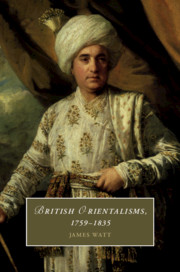Book contents
- British Orientalisms, 1759–1835
- Cambridge Studies in Romanticism
- British Orientalisms, 1759–1835
- Copyright page
- Contents
- Acknowledgements
- Introduction
- Chapter 1 ‘Those Islanders’
- Chapter 2 ‘Indian Details’
- Chapter 3 ‘All Asia Is Covered in Prisons’
- Chapter 4 ‘In Love with the Gopia’
- Chapter 5 ‘Imperial Dotage’ and Poetic Ornament in Romantic Orientalist Verse Narrative
- Chapter 6 Cockney Translation
- Chapter 7 ‘It Is Otherwise in Asia’
- Conclusion
- Bibliography
- Index
- Cambridge Studies in Romanticism
Chapter 2 - ‘Indian Details’
Fictions of British India, 1774–1789
Published online by Cambridge University Press: 31 July 2019
- British Orientalisms, 1759–1835
- Cambridge Studies in Romanticism
- British Orientalisms, 1759–1835
- Copyright page
- Contents
- Acknowledgements
- Introduction
- Chapter 1 ‘Those Islanders’
- Chapter 2 ‘Indian Details’
- Chapter 3 ‘All Asia Is Covered in Prisons’
- Chapter 4 ‘In Love with the Gopia’
- Chapter 5 ‘Imperial Dotage’ and Poetic Ornament in Romantic Orientalist Verse Narrative
- Chapter 6 Cockney Translation
- Chapter 7 ‘It Is Otherwise in Asia’
- Conclusion
- Bibliography
- Index
- Cambridge Studies in Romanticism
Summary
Like Rasselas and other works of the previous decades, the Irish novelist Charles Johnstone’s The History of Arsaces, Prince of Betlis (1774) uses a minimally substantiated ‘Eastern’ setting with an allegorical function. Its main narrative describes the predicament of the ‘Byrsans’, who had founded colonies which ‘drained their own country of its most useful inhabitants’, and which over time ‘felt their own strength’ and asserted their independence, ever after ‘carr[ying] themselves like states allied upon equal terms, rather than subjects’. As he wrote in the preface to his tale, Johnstone assumed that readers would not expect to find closer description of ‘the manners of the times and countries, in which the various scenes of the work are laid’, since he drew ‘the universal manners of Nature, which suit all climes and ages’, and it ‘would only have been pedantry’ to do otherwise. In his next work, The Pilgrim: Or, A Picture of Life (1775), by contrast, Johnstone followed Goldsmith’s example instead, introducing the figure of a Chinese philosopher writing to a fellow countryman about his experiences in Britain. The Pilgrim addresses the state of the nation (including Britain’s relationship with its American colonies) in a similar fashion to Arsaces, but its adaptation of the genre of informant narrative means that its attention to contemporary detail is very different. Albeit that it names India as ‘Mogulstan’, The Pilgrim refers to a more specific milieu than Johnstone’s previous work, as is demonstrated by the fact that its protagonist, on the sea voyage from China, encounters a number of Britons returning home from the subcontinent.
- Type
- Chapter
- Information
- British Orientalisms, 1759–1835 , pp. 57 - 89Publisher: Cambridge University PressPrint publication year: 2019



